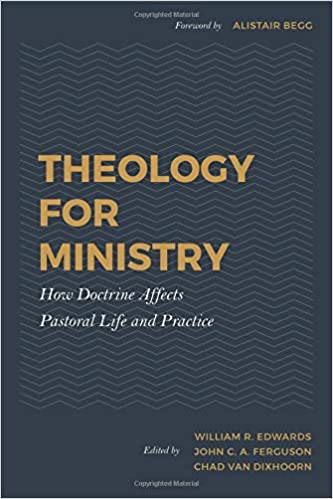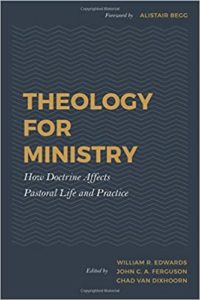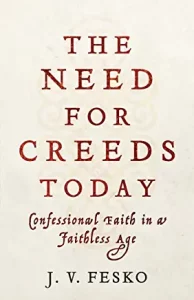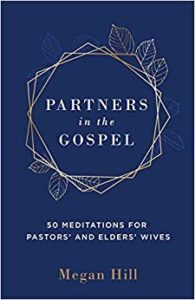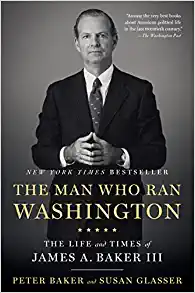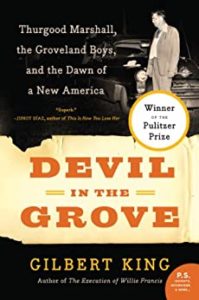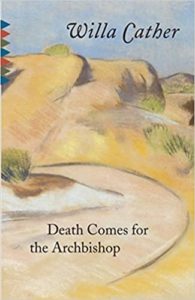When I finish reading or listening to a book, I add it to my annual “books read” list. My 2021 list is at the end of this post.
2021 Reading Highlights
One of the privileges I enjoy as a seminary professor is being asked to read books before they are published. Among the best books I read this year is Theology for Ministry: How Doctrine Affects Pastoral Life and Practice. I will be adding it to my required reading list for students. Twenty-six pastor-theologians, touching upon every major area of ministry, winsomely demonstrate how theology gives shape to a godly pastorate. That this book honors Sinclair Ferguson is especially appropriate — his books, lectures, and sermons mine God’s word and Reformation theology, and set their riches before God’s beloved church. I can think of no better model of ministerial work. (Release date: spring 2022).
Also set for release in the spring is Joe Barnard’s Surviving the Trenches: Killing Sin Before Sin Kills You. Tragically, mortification is a word that has all but disappeared from our theological vocabulary. Unmortified sins devastate not only individual lives, but wreak havoc on families and churches. This book appeals to the consciences of Christian men, offering them a sound biblical theology of sin as well as practical strategies for fighting it. The author targets four specific sins: pride, lust, vanity, and sloth. He exposes their deadliness, but also proclaims the hope every Christian man has in his all-sufficient Savior.
Megan Hill’s Partners in the Gospel: 50 Meditations for Pastors’ and Elders’ Wives should be read by pastors and elders, too. They will be rewarded with a deeper understanding of their gospel partners and cherish them all the more.
As a confessional Presbyterian, I am grateful for John Fesko’s The Need for Creeds Today. The book includes a brief survey of the historic Reformed confessions of the sixteenth and seventeen centuries and their benefits, as well as practically demonstrating how confessions shape Christian piety.
In addition to tours of duty as Ronald Reagan’s and George H. W. Bush’s White House Chief of Staff, James Baker served our nation as Secretary of State and Secretary of the Treasury. Any leader will benefit from a study of his work in staff management, policy development, and crisis control. Peter Baker and Susan Glasser tell his story well in The Man Who Ran Washington: The Life and Times of James A. Baker III.
Robert Elder’s biography of John C. Calhoun and Allen Guelzo’s of Robert E. Lee are splendid studies of two prominent 19th century southerners. In the rush to remove monuments and rename buildings, it would be a pity if our knowledge of the era were superficial, our judgments based on caricatures of men rather than a scholarly examination of their lives. The study of history should be more than a melodramatic exercise of dividing the world into good guys and bad guys.
Two civil rights era books were exceptionally good reads. In Devil in the Grove, Gilbert King recounts Thurgood Marshall and his NAACP staff’s heroic struggle to defend falsely accused black defendants in Lake County, Florida. Marshall’s later Supreme Court opinions are often debated, but about his moral and physical courage in confronting racial injustice and brutal violence there is no debate.
Every Mississippian should be familiar with the life, work, and murder of Vernon Dahmer, a business owner and president of the Forrest County NAACP. Dahmer worked tirelessly to register black voters in Hattiesburg and surrounding communities. His 1966 assassination by the Laurel-based White Knights of the Ku Klux Klan is the subject of Curtis Wilkie’s When Evil Lived in Laurel.
Willa Cather and George Eliot are among my favorite novelists. Cather’s Death Comes for the Archbishop is a beautiful portrayal of pastoral courage and devotion. I find myself rereading it from time-to-time, always finishing it refreshed and inspired. One needn’t be a Catholic to appreciate this profoundly moving story.
Besides crafting memorable stories and writing with unsurpassed elegance, Eliot was a shrewd analyst of human behavior and especially pre-marital and marital relationships. I’ve long felt that Christian pastors and counselors would find her novels to be helpful as counseling manuals. In connection with her, one of my colleagues reminded me of Yogi Berra’s aphorism, you can observe a lot just by watching. Eliot observed life with uncommon insight and detail, and her gifts are well on display in Silas Marner and Daniel Deronda.
My 2021 Reading List
-
Gary A. Parrett and S. Steve Kang, Teaching the Faith and Forming the Faithful: A Biblical Vision for Education in the Church
-
Erik Larson, Dead Wake: The Last Crossing of the Lusitania
-
Harold l. Senkbeil, Christ and Calamity: Grace and Gratitude in the Darkest Valley
-
Mary Mann Hamilton, The Trials of the Earth
-
Tara Isabella Burton, Strange Rites: New Religions for a Godless World
-
William R. Edwards, John C.A. Ferguson, Chad Van Dixhoorn, Theology for Ministry: How Doctrine Affects Pastoral Life and Practice
-
Gilbert King, Devil in the Grove: Thurgood Marshall, the Groveland Boys, and the Dawn of a New America
-
David S. Reynolds, Abe: Abraham Lincoln in His Time
-
Donald Macleod, Compel Them to Come In: Calvinism and the Free Offer of the Gospel
-
William Perkins, The Art of Prophesying
-
Helen Andrews, Boomers: The Men and Women Who Promised Freedom and Delivered Disaster
-
Chase, C.L. Good, Good Father: Knowing God As He Wants To Be Known
-
Matzko, Paul. The Radio Right: How a Band of Broadcasters Took on the Federal Government and Built the Modern Conservative Movement
-
James Eglinton, Bavinck: A Critical Biography
-
Denise Woods, The Power of Voice: A Guide to Making Yourself Heard
-
Voddie T. Baucham Jr., Fault Lines: The Social Justice Movement and Evangelicalism’s Looming Catastrophe
-
J.V. Fesko, The Need for Creeds Today: Confessional Faith in a Faithless Age
-
Diane Langberg, Redeeming Power: Understanding Authority and Abuse in the Church
-
Maryanne Wolf, Reader, Come Home
-
Ferry, Luc. A Brief History of Thought: A Philosophical Guide to Living
-
Jemar Tisby, The Color of Compromise: The Truth about the American Church’s Complicity in Racism
-
Robert Elder, Calhoun: American Heretic
-
Curtis Wilke, The Fall of the House of Zeus: The Rise and Ruin of America’s Most Powerful Trial Lawyer
-
Willa Cather, Death Comes for the Archbishop
-
Greg McKeown, Essentialism: The Disciplined Pursuit of Less
-
Matthew Barrett, Simply Trinity: The Unmanipulated Father, Son, and Spirit
-
Peter Baker and Susan Glasser, The Man Who Ran Washington: The Life and Times of James A. Baker III
-
Peter Seewald, Benedict XVI : Life (vol. 1)
-
Jonathan T. Pennington, Small Preaching: 25 Little Things You Can Do Now to Become a Better Preacher
-
Megan Hill, Partners in the Gospel: 50 Meditations for Pastors’ and Elders’ Wives
-
Anthony Trollope, He Knew He Was Right
-
Greg Lanier, A Christian’s Pocket Guide to How We Got the Bible
-
Jason L. Riley, Maverick: A Biography of Thomas Sowell
-
Paul David Tripp, Lead: 12 Gospel Principles for Leadership in the Church
-
Abigail Shrier, Irreversible Damage: The Transgender Craze Seducing Our Daughters
-
Scott R. Swain, The Trinity: An Introduction
-
O. Garfield Jones, Parliamentary Procedure at a Glance
-
Michael Lewis, The Premonition: A Pandemic Story
-
Ryan M. McGraw, By Good and Necessary Consequence
-
J.C. Ryle, Expository Thoughts on the Gospels: John (vol. 2)
-
Gordon J. Keddie, John: Chapters 1-12
-
William Shakespeare, Henry IV (part one)
-
Kathleen Nielson, Prayers of a Parent for Young Adults
-
Jim Dent, Twelve Mighty Orphans: The Inspiring True Story of the Mighty Mites Who Ruled Texas Football
-
John Calvin, Sermons on Titus
-
John Stott, Guard the Truth: The Message of 1 Timothy & Titus
-
Jonathan Aitken, John Newton: From Disgrace to Amazing Grace
-
Simon Edge, The End of the World is Flat
-
Jason Helopoulos, Covenantal Baptism
-
David Strain, Expository Preaching
-
Guy M. Richard, Persistent Prayer
-
Curtis Wilke, When Evil Lived in Laurel: The “White Knights” and the Murder of Vernon Dahmer
-
Helen Dale, The Hand That Signed the Paper
-
Vivek H. Murthy, Together: The Healing Power of Human Connection in a Sometimes Lonely World
-
Jaqueline Winspear, Maisie Dobbs
-
Irwyn L. Ince Jr., The Beautiful Community: Unity, Diversity, and the Church at Its Best
-
Jonathan Laundry Cruse, What Happens When We Worship
-
Allen C. Guelzo, Robert E. Lee: A Life
-
Helen Joyce, Trans: When Ideology Meets Reality
-
James M. Hamilton Jr., Song of Songs: A Biblical-Theological, Allegorical, Christological Interpretation
-
Julia Reed, The House on First Street: My New Orleans Story
-
Chase R. Kuhn and Paul Grimmond, Theology Is for Preaching: Biblical Foundations, Method, and Practice
-
Jaqueline Winespear, Birds of a Feather
-
Augustine, The City of God (Books 1-10; New City Press)
-
Joe Barnard, Surviving the Trenches: Killing Sin Before Sin Kills You
-
Joel R. Beeke, The Family at Church: Listening to Sermons and Attending Prayer Meetings
-
Gerald Bray, Preaching the Word with John Chrysostom
-
Jacqueline Winspear, Pardonable Lies
-
Kathleen Nielson, Prayers of a Parent for Adult Children
-
Kathleen Nielson, Prayers of a Parent for Teens
-
Kathleen Nielson, Prayers of a Parent for Young Children
-
Rick Atkinson, The British Are Coming: The War in America, Lexington to Princeton, 1776-1777
-
Peter W. Wood, 1620: A Critical Response to the 1619 Project
-
Andrew Klavan, The Great Good Thing: A Secular Jew Comes to Faith in Christ
-
John R. Bower, The Larger Catechism: A Critical Text and Introduction
-
George Eliot, Silas Marner
-
Jonathan G. Kline, Keep Up Your Biblical Greek in Two Minutes a Day
-
Jacqueline Winspear, Messenger of Truth
-
John Le Carré, Silverview
-
The Bible
-
John McWhorter, Woke Racism: How a New Religion Has Betrayed Black America
-
Megan Hill, Patience: Waiting with Hope
-
James M. Olson, To Catch a Spy: The Art of Counterintelligence
-
George Eliot, Daniel Deronda
-
William Henry Green, Conflict and Triumph: The Argument of Job Unfolded
